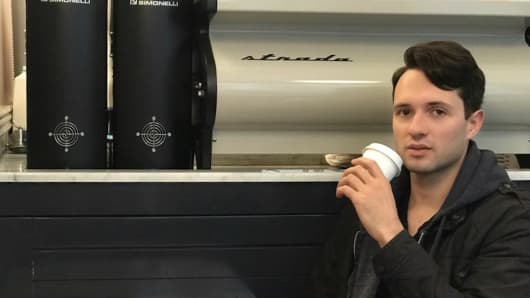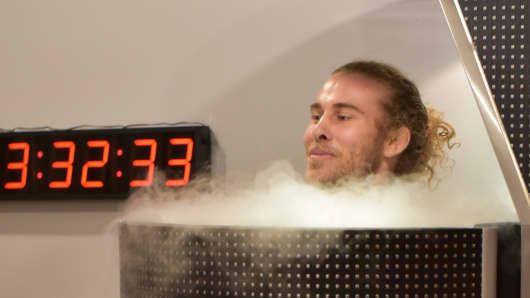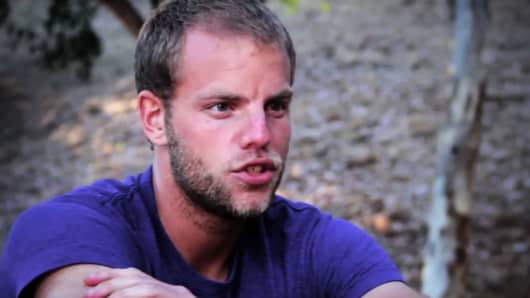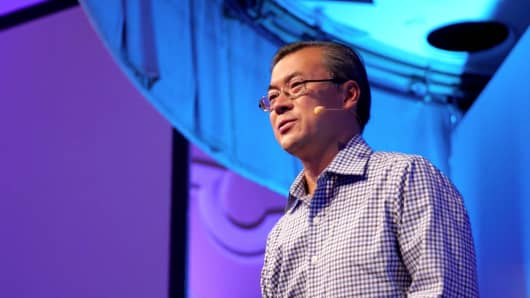Click here to get this post in PDF

Tech elites are fasting and taking ice baths to push their bodies to work harder
- A growing number of technology workers see “positive stress” as key to working longer hours.
- Zachary Rapp runs three start-ups alongside a routine of fasting, cold showers, hot yoga and restrictive dieting.
- “Right now I’m trying to push through an inhuman amount of work,” he said.
Zachary Rapp wakes up most mornings at the crack of dawn, goes for a run, sips black coffee while ripping through emails, and then steps into a freezing cold shower.
It’s a routine designed to reduce the stress of juggling three different health and biotech start-ups for 18 hours a day.
Rapp is part of the growing “positive stress” movement, consisting of tech workers who claim that such radical tactics will help them live better and longer or — in Silicon Valley — work better for longer.
Inspired by influencers in entertainment, entrepreneurship and science, the positive stress practitioners seek out some combination of extreme temperatures, restrictive diets, punishing exercise routines and general discomfort. There’s also whole body cryotherapy — electric walk-in cold chambers — popping up at spas across the country.
“Right now I’m trying to push through an inhuman amount of work,” Rapp told CNBC.
Rapp is co-founder of digital health start-up PhenoMx; the CEO of SigmaGenetics, which makes a non-invasive device that’s trying to deliver DNA into cells using magnetic fields; and the head of business development at medical device maker Altoida.
“It keeps me balanced,” Rapp said, referring to ice baths, hot yoga, intermittent fasting and the Whole30 diet he’ll try next month, which requires cutting out grains, legumes, dairy, sugar and alcohol. “Like the stress is leaving my body, so I don’t feel like I’m hitting a brick wall.”
One thought leader in the positive stress world is Dutch extreme athlete Wim Hof, who earned the moniker “ice man” for his ability to withstand severe cold using deep breathing exercises. Hof ‘s ideas have taken off in Silicon Valley following a 2017 speaking tour and a series of workshops.
Thanks to Hof, cold showers are now a fad in Silicon Valley. Some even call it a form of therapy.
“There’s a really big segment that has gotten into it recently,” said Joel Runyon, a triathlete who’s given TED talks about his passion for cold showers.
Runyon trademarked the term Cold Shower Therapy and has a mobile app so fellow advocates can challenge themselves. He credits Hof for helping “convert” the tech elite. He said that doing something uncomfortable every day makes everything else seem doable, a particularly valuable technique for entrepreneurs.
Another positive stress influencer is Ryan Holiday, who wrote several books in an attempt to revive a 2,000-year-old set of ideas called stoicism, which advocates self-control and a lack of indulgence.
And then there’s Joon Yun, the Silicon Valley-based benefactor of a $1 million prize that aims to reward researchers for hacking the aging code.
“You’ve come right to the source,” said Yun, when asked about the positive stress idea. “I’ve given talks at all the major entrepreneurial summits and have been teaching interval training involving heat and exercise to help the body endure.”
Yun, a managing partner of hedge fund Palo Alto Investors, has addressed crowds of entrepreneurs in technology hubs across the country about the importance of restoring the body’s balance by using low amounts of stress.
Rapp doesn’t credit anyone in particular for his lifestyle choices. He said he stumbled across these methods in college, where he got into the habit of taking ice baths to recover from lacrosse games. He got back into it while trying to get his three companies off the ground.
Not for everyone
Rapp sleeps five to seven hours a night and drinks a glass of wine or a scotch as a rare treat. He said he only gets sick once a year. For him, the difference between day-to-day stress, like the kind we feel when moving apartments, and positive stress is that the latter involves pushing the body to extremes and forcing it to build up a tolerance.
But positive stress isn’t for everyone. Yun doesn’t advise forcing your body to withstand extreme temperatures, for instance.
“That’s going to kill people who aren’t young,” he said.
Instead, Yun prefers a concept he calls “functionality longevity,” which involves increasing range into an individual’s life to stave off the aging process. That could be a cool but not freezing shower, exploring a new walk to work, eating a bag of Doritos once a month, or trying out a different exercise at the gym.
But Yun said he does buy into the theory we need variety because range — whether it’s hearing, eyesight or an ability to bounce back after a night out wears away as we age. He’s planning to work with a team of researchers at the University of California, San Francisco to study the topic.
“That’s what health is,” he said. “It’s in is the ability to tolerate stress.”
I hope you enjoyed the article. The Loveland Medical Clinic runs the 22 Day Weight Loss Program which uses diet to improve your health. This in conjunction with cold and heat therapy can make amazing changes to your health.













